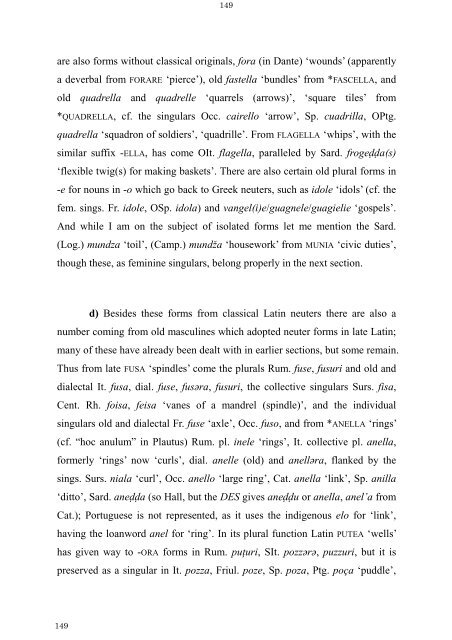The Latin Neuter Plurals in Romance - Page ON
The Latin Neuter Plurals in Romance - Page ON
The Latin Neuter Plurals in Romance - Page ON
Create successful ePaper yourself
Turn your PDF publications into a flip-book with our unique Google optimized e-Paper software.
149<br />
149<br />
are also forms without classical orig<strong>in</strong>als, fora (<strong>in</strong> Dante) ‘wounds’ (apparently<br />
a deverbal from FORARE ‘pierce’), old fastella ‘bundles’ from *FASCELLA, and<br />
old quadrella and quadrelle ‘quarrels (arrows)’, ‘square tiles’ from<br />
*QUADRELLA, cf. the s<strong>in</strong>gulars Occ. cairello ‘arrow’, Sp. cuadrilla, OPtg.<br />
quadrella ‘squadron of soldiers’, ‘quadrille’. From FLAGELLA ‘whips’, with the<br />
similar suffix -ELLA, has come OIt. flagella, paralleled by Sard. frogedda(s)<br />
‘flexible twig(s) for mak<strong>in</strong>g baskets’. <strong>The</strong>re are also certa<strong>in</strong> old plural forms <strong>in</strong><br />
-e for nouns <strong>in</strong> -o which go back to Greek neuters, such as idole ‘idols’ (cf. the<br />
fem. s<strong>in</strong>gs. Fr. idole, OSp. idola) and vangel(i)e/guagnele/guagielie ‘gospels’.<br />
And while I am on the subject of isolated forms let me mention the Sard.<br />
(Log.) mundza ‘toil’, (Camp.) mundža ‘housework’ from MUNIA ‘civic duties’,<br />
though these, as fem<strong>in</strong><strong>in</strong>e s<strong>in</strong>gulars, belong properly <strong>in</strong> the next section.<br />
d) Besides these forms from classical <strong>Lat<strong>in</strong></strong> neuters there are also a<br />
number com<strong>in</strong>g from old mascul<strong>in</strong>es which adopted neuter forms <strong>in</strong> late <strong>Lat<strong>in</strong></strong>;<br />
many of these have already been dealt with <strong>in</strong> earlier sections, but some rema<strong>in</strong>.<br />
Thus from late FUSA ‘sp<strong>in</strong>dles’ come the plurals Rum. fuse, fusuri and old and<br />
dialectal It. fusa, dial. fuse, fusəra, fusuri, the collective s<strong>in</strong>gulars Surs. fisa,<br />
Cent. Rh. foisa, feisa ‘vanes of a mandrel (sp<strong>in</strong>dle)’, and the <strong>in</strong>dividual<br />
s<strong>in</strong>gulars old and dialectal Fr. fuse ‘axle’, Occ. fuso, and from *ANELLA ‘r<strong>in</strong>gs’<br />
(cf. “hoc anulum” <strong>in</strong> Plautus) Rum. pl. <strong>in</strong>ele ‘r<strong>in</strong>gs’, It. collective pl. anella,<br />
formerly ‘r<strong>in</strong>gs’ now ‘curls’, dial. anelle (old) and anelləra, flanked by the<br />
s<strong>in</strong>gs. Surs. niala ‘curl’, Occ. anello ‘large r<strong>in</strong>g’, Cat. anella ‘l<strong>in</strong>k’, Sp. anilla<br />
‘ditto’, Sard. anedda (so Hall, but the DES gives aneddu or anella, anel’a from<br />
Cat.); Portuguese is not represented, as it uses the <strong>in</strong>digenous elo for ‘l<strong>in</strong>k’,<br />
hav<strong>in</strong>g the loanword anel for ‘r<strong>in</strong>g’. In its plural function <strong>Lat<strong>in</strong></strong> PUTEA ‘wells’<br />
has given way to -ORA forms <strong>in</strong> Rum. puŃuri, SIt. pozzərə, puzzuri, but it is<br />
preserved as a s<strong>in</strong>gular <strong>in</strong> It. pozza, Friul. poze, Sp. poza, Ptg. poça ‘puddle’,









